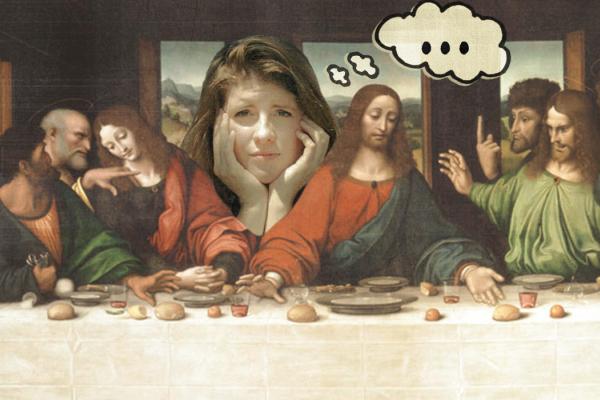Mallory Ortberg, comedy queen of the internet (and more formally known as co-editor of The Toast), spoke at Calvin College’s Festival of Faith & Writing in April. Though daughter to evangelical pastor John Ortberg and sister to Laura Turner, a religion and culture writer, Mallory is a previously avowed atheist whose own work deals more with texts from literary characters and the dirtbags of history. She sat down with Sojourners to chat online humor, death, how to pray, and why God is probably a little dog. “I think this is the most personal interview I’ve ever given,” she said, and we’re OK with that.
Woodiwiss: Why do you think it’s so easy to satirize Christians?
Ortberg: You know, I think it’s easy to satirize any in-group you’ve been a part of. I was obviously raised in a very Christian environment, and my first publication for money was actually at the Wittenberg Door — do you remember that? It was the first Christian satire magazine, that very 70s “we’re Christians but we’re funny,” and I did worship music mad libs. Which is like lowest common denominator parody.
In mainstream Christianity in America today there’s this really funny combination where it’s incredibly dominant, it dominates the culture, and also many people within it feel somehow persecuted. Which is a sort of fascinating paradox to watch people engage in. So that’s something that lends itself to humor.
Woodiwiss: The Taylor Swift syndrome.
Ortberg: Totally! I can totally see that. And all the things that make human beings vulnerable in terms of connection, not being sure what you believe or what you think — that’s sad, but part of the business of life. It’s inherently funny that we’re all little bags of meat with questions. That’s funny and scary and I love making jokes about it.
Woodiwiss: Do you have spiritual writers or figures in history that you admire?
Ortberg: I love the desert fathers. They are so neat. Especially because my life is all about maximizing comfort — like, my house is cozy, my dog and I have little spots on the couch that’s just shaped like our butts cause we just love being on the couch. And these guys are like, “Well, I spend a lot of time not eating, and weaving baskets until my fingers bleed, but could I spend more time weaving baskets until my fingers bleed?”
The desert fathers and mothers, especially Athanasius, are writers that I will read and re-read — Julian of Norwich, Teresa of Avila, all the usual suspects. Brother Lawrence, I love that little motherf----r so much. I’m very fond of that era in the church, post-martyrdom, when the church was still very North African, Middle Eastern, and it was still very much, “How do we form an identity that’s not about being persecuted, but that’s also not about being a dominant cultural force?” And the ways in which it was very much about creating the beloved community. I love that very, very much. Those dudes are my dudes, for sure.
Woodiwiss: With your Two Monks series in particular, was that an idea for those two characters? Like this character is going to embody what it’s like to be always certain about truth—
Ortberg: There’s something really wonderful in comedy about a dialogue between someone who has no certainty, and someone who is really wrong but has a ton of certainty. And they’re stumbling forward and they think, “We’re really getting somewhere!” And they’re not, at all.
… Everyone likes to think that in the past when any persecution or a perspective that we now believe to be totally wrong was going on, we like to think, “I would have really stood up against that. I would have really gone against the grain.” As opposed to, what are all the situations in our current lives that we don’t do that in?
Click to listen along: One of the posts I wrote recently was called, “Reasons I Would Not Have Been Burned As A Witch.” Sometimes when people think about history, especially if you’re a type of person like me, you kinda like to think of yourself like, “Ooh, I’m a little outside the mainstream, I’m a little dangerous, I probably would have been burned as a witch!” And like, no, I absolutely would not have. I love conforming! If I had all the information they had and I actually believed in witches, I would have been terrified of them. No way I would have been like, “Cool, I’m like, aware of modern sexuality, and science, take me to the stake, I don’t give a shit!” I would have been like, “Goody Bunk next door killed my sheep, take her away. Keep the stakes.” I am a coward and ignorant, and I need to really lean into that.
It’s not my favorite thing about myself — I wish I was braver. I think you have to acknowledge and lovingly accept your own cowardice if you want to do anything about it. And I think cowardice is funny.
Woodiwiss: One thing I really like about yours and [co-editor of The Toast] Nicole’s dynamic is how you talk about things like cowardice and vulnerability and faith very publicly — we don’t see that often from editors. Nicole has had a very public conversion, and you have your own history of growing up in the church and now not being part of it, but still having a professed admiration. What’s that been like as business partners, and also just as friends?
Ortberg: The last time I wrote anything about growing up in the church was an essay I did a couple years ago about leaving the church. There’s a lot I still really like about that essay. And then when I got sober, right around when we started The Toast, I found myself very embarrassed to think, “Oh, no — I think I love God. Oh, this is so embarrassing.”
And I never told Nicole, because I thought, well, she’d be embarrassed for me — it’s nobody’s business, don’t worry about it. So imagine my surprise when she says, “Look I have to tell you something,” and I had to say, “Look, I have to tell you something, too, ummm.”
I think sort of the best way I can sum it up for myself is, “There’s probably not a god, but God helps me.” … But I’m not just appreciative bystander to Nicole’s religious faith. I also have some. I don’t always know how to discuss it well. Recently a friend of mine asked point blank if I was, and I was like, “Ha, no, don’t be ridiculous!” And later I had to say like, “Oh, a little though. Sorry. But kind of yes.”
Prayer was not something that made a lot of sense to me. Because it seems really clear to me that outcomes in the world are fairly inconsistent … But [another] sort of prayer is, “Given that anything can happen to me, given that life is sometimes cruel and sometimes beautiful and I don’t know what’s coming next, how can I handle what happens next best? How can I ask God to be with me in whatever shit goes down?” And that is the kind of prayer makes a lot of sense to me.
Woodiwiss: Yeah! But that kind of prayer seems pretty honest.
Ortberg: Well, and this is goofy, but — we’re just going all in, man! I was recently traveling in New Zealand, and I was walking around in this preserve up above Wellington in super ancient forests and they were like, "This tree is a hundred million years old," and I was just overwhelmed with this sense of time, in a way that was very — I would describe it as horrified awe. … I felt very overwhelmed with a sense of, "I have been given so much, and the last thing that the universe or God is going to give me is death, and I don’t want that."
And the prayer that I had over and over was just, “God, help me die.” It was this very anxious, very focused prayer, and by the time I walked out of there I didn’t feel like, “Cool, I’m ready to die at any minute,” but I felt like my prayer over and over again had just been, “God, help me accept death from you when the day comes.”
And if all I get out of recovery and out of spirituality is that I die less panicked and afraid, and spend less of my time in between now and death feeling terrified and vulnerable and lashing out, I’ll take it. Man, that’s great. If that’s all it’s got for me, I appreciate it very, very much.
Woodiwiss: Do you have two seconds for a biblical word association game?
Ortberg: Hell. Yes.
Woodiwiss: Good, I was hoping you’d say yes.
Ortberg: I love this.
Woodiwiss: Okay, so when I say a word—
Ortberg: Oh my god.
Woodiwiss: —say the first thing that comes to your mind.
Ortberg: Hit me.
Woodiwiss: Calvin.
Ortberg: Tulips.
Woodiwiss: Huh! Okay.
Ortberg: You know, cause total depravity.
Woodiwiss: I got it!
Ortberg: Oh, we’re on Calvin College campus, I’m sorry I tried to explain the concept of tulips to you, please forgive me.
Woodiwiss: Forgiven. David?
Ortberg: Mephibosheth! Remember the little guy who came to him and was like, Please don’t kill me and take my land, and David was like, I definitely won’t, you can come be part of my court, and then someone else killed him, and he was like, Oh no, I guess I’ll take his land?
Woodiwiss: Nope, I don’t remember that!
Ortberg: It was solid.
Woodiwiss: Julian of Norwich?
Ortberg: Flames. Cause in all the pictures of the divine that’s how they painted praying — fire would be touching your head. Which I think is great. … I feel like I’m not doing well at this, but let’s keep going.
Woodiwiss: Apocrypha.
Ortberg: Ohhhhh. Catholics. I’m so sorry, please note that I love Catholics! I’m not suggesting they invented apocrypha, lots and lots of various organizations have it, I love the Gospel of Thomas real bad.
Woodiwiss: I’ll include all these as footnotes: Loves Catholics.
Ortberg: Appreciate it.
Woodiwiss: Cross.
Ortberg: I honestly picture a little British school boy novel, that’s like, “We’re very cross, we’ve had a row.” I hope you can publish that actual quote, like, “She’s very cross.”
Woodiwiss: Episcopalian? Haha.
Ortberg: Come ON. Come on, I love Episcopalians so much but everyone knows that’s just so flour. It’s like the spiritual equivalent of watching Frasier, you know? Like, come at me Episcopalians, what are you gonna do?
Woodiwiss: I probably should have started this interview with “I’m Episcopalian…”
Ortberg: I love Episcopalians so much. You guys are the best. You’re so charming, you’re always on the right side of history.
Woodiwiss: Thank you. Sojourners?
Ortberg: I actually think of Sojourner Truth. That’s probably the first thing that comes to mind.
Woodiwiss: And, God.
Ortberg: A small dog. A small dog that has arthritis in its back hips. And is always making this sound that a dog does when its sleepy and you try to pick it up, like, “Ennhhhhhh.”
Woodiwiss: Like the sad one, or the happy—
Ortberg: It’s like a little like—
Woodiwiss: “Don’t bother me.”
Ortberg: Like, “Do I have to wake up all the way right now?”
Woodiwiss: Yep.
Ortberg: Like, just that.
Woodiwiss: You know, I just imagine that’s probably what God’s like.
Ortberg: It would explain a lot, man. It would explain a lot.
Got something to say about what you're reading? We value your feedback!

